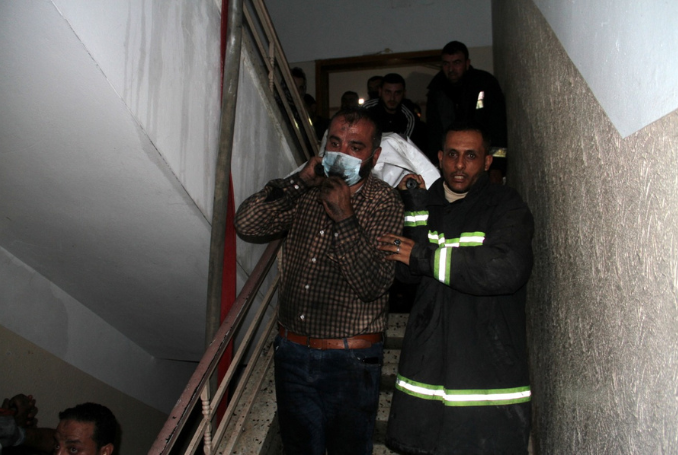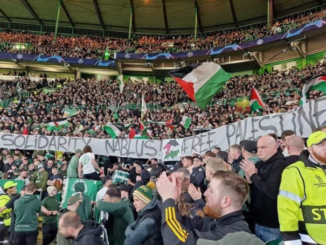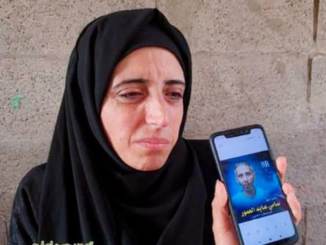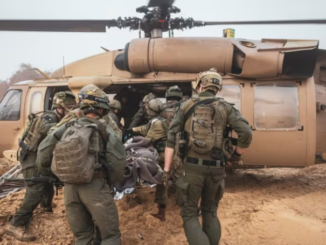
On December 18, 2022, a house fire in Gaza killed 21 civilians, including 10 children, all belonging to the same family.
They were celebrating a birthday when the gasoline that they had stored fueled the devastating fire.
This terrible accident left Palestinians in Gaza with a deep loss. They are still mourning, especially the people in Jabaliya camp, where the family lived.
“When the house fire started, we heard people screaming. We rushed to help. The fire was raging and there were a woman and her child trying to get out of the window as they were burning, said Mohammed Al Khaldi, an eyewitness.
“The window was closed with iron bars. They couldn’t escape, and we couldn’t help,” Al Khaldi added.
Even though the metal gate to the building was closed, neighbors managed to break through. They rushed to the burning third-story apartment. The door was closed airtight. They spent more than half an hour trying to break through to the apartment as they waited for the civil defense unit, which they had called to help fight the fire.
When the neighbors reached the house, the fire was already intense. The smoke was severe. They could barely see, but they realized there was a big number of victims in one room.
Challenges for the Civil Defense in Gaza
The civil defense arrived 30 minutes after the first call. Soon, they ran out of water and tried to get more water from a well in the neighborhood, which unfortunately was inaccessible because the electricity was cut off.
The civil defense workers decided to bring water from another neighborhood. When they finally managed to extinguish the fire, everyone was found burned and dead.
“The civil defense confronts a huge shortage of equipment,” Mahmoud Bassal, the spokesman of the civil defense unit in Gaza, told The Palestine Chronicle.
“Since 2007, Israel has banned any equipment access for the civil defense in Gaza. We face intense military escalations launched by Israel now and then,” Bassal added.
“The situation here is very dangerous. We need an empowered civil defense”.
In 2007, Israel imposed a lockdown over Gaza, which has severely impacted people due to electricity cuts, water and air pollution, shortage of medical and civil defense equipment.
Even though the recent house fire was not caused by an Israeli attack, Palestinians nevertheless blame Israel for the civil defense’s weak and insufficient response.
In fact, due to the hermetic Israeli blockade of Gaza and its harmful impact, civil defense, in particular, cannot perform its duties to the fullest extent.
Israel’s Attacks on Gaza
On May 16, 2021, Israel targeted Al Wahda Street in Gaza City, leaving at least 44 Palestinians, including 18 children, killed.
For about an hour, Israeli bombs rained down on the area. The homes eventually collapsed on the families living in them.
With surrounding streets severely damaged, it was difficult for ambulances from the nearby Al-Shifa hospital to reach the site of the bombing.
Palestinian rescue teams spent days pulling bodies from the rubble, dead and alive.
“When there is a military escalation in Gaza, I don’t go home,” Mustafa Hamdan, a civil defense worker who witnessed the Al Wahda bombardment, told The Palestine Chronicle
“Do you know that there is no real international immunity for civil defense workers in Gaza? We sacrifice our lives for our people, but we desperately need better equipment,” Hamdan added.
“Our inability to do our job well is not a matter of laziness, but because we don’t have adequate tools.”
In 2014, Israel bombed a civil defense vehicle in which Rami Daher, a civil worker, was killed in Al Shujaiya camp. “Many civil defense workers were killed during previous intense Israeli assaults over Gaza, while they were doing their work,” Hamdan continued.
When Hamdan reached Al Wahda street, it was full of rubble and destruction. He was horrified by the scene. It took him a while to grasp the shock and decide what to do.
“I needed a lot of civil defense supplies. I recall I needed modern bulldozers and sensors to know where the victims were. I was able to save a few people, I remember Shokri and Zinab Al Kolak. I would have been able to rescue more, had we had better equipment,” he added.
Shortage of Supplies and Equipment
In the latest assault over Gaza, on August 6, 2022, Israel targeted a residential building in Alshout camp, a very crowded neighborhood. A few houses were entirely destroyed and many others were partially damaged.
Eight Palestinians were killed during the airstrike. When the civil defense arrived, they managed to put out a house fire.
Then, the civil defense could pull four injured women, three children, and two dead bodies from the rubble.
They were actually digging with their bare hands. They couldn’t continue that way and asked for a heavier bulldozer and more workers to come from the northern area of the Strip to the southern, which takes approximately two hours.
Meanwhile, they waited for permission from two of the neighbors to let them destroy their already damaged houses to make space for the diggers and bulldozers to drive through. With no hesitation, the neighbors agreed.
“After two hours, the heavy bulldozer reached the house. The civil defense pulled out the dead bodies,” Falastin Jouda, an eyewitness, told The Palestine Chronicle.
“Two of them died from lack of oxygen. They could have saved them, but the bulldozer arrived too late, and rescue equipment was not sophisticated enough rescue equipment,” Jouda added.
“We need more workers. We need more sophisticated equipment to be able to rescue people,” said Osama Abu Mohsen, a civil defense worker who participated in the rescue operation in Al Shout refugee camp.
“If the world really cared about us, they would supply us with training and equipment,” Abu Mohsen continued.
“Unfortunately, the civil defense in Gaza confronts quite a huge shortage of equipment and training. In times of any aggression, assaults, or urgent accidents, we have to reach out to other institutions and organizations, ” the civil defense spokesman, Mahmoud Bassal, concluded.

– Shahd Safi is a Gaza-based freelance translator and writer for We Are Not Numbers. WANN contributed this article to The Palestine Chronicle.







